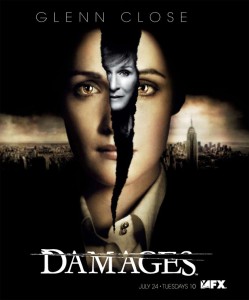A Damaged Conclusion
 Try as I might, I can’t make sense of the concluding scenes of the FX drama Damages. And in truth, I guess it is a question about a narrative thread that has run throughout the entire series that I’ve largely failed to interrogate until weighing the significant final scenes of the series. This legal/thriller/drama has pushed many boundaries in narrative form and visual style to provide one of the most interesting series on my DVR in the last few years. As one for whom the inability to predict what will happen next is a key measure of quality and enjoyment, Damages consistently surprised and challenged me to work to put together the pieces of its jumbled narrative order and complicated investigatory machinations. Moreover, it starred Glenn Close in fine form as the ruthless and genius litigator Patty Hewes who, over the course of the last three seasons, took on corporate excesses and greed in a way that added layers of meaning to the news coverage of the real world situations her cases paralleled.
Try as I might, I can’t make sense of the concluding scenes of the FX drama Damages. And in truth, I guess it is a question about a narrative thread that has run throughout the entire series that I’ve largely failed to interrogate until weighing the significant final scenes of the series. This legal/thriller/drama has pushed many boundaries in narrative form and visual style to provide one of the most interesting series on my DVR in the last few years. As one for whom the inability to predict what will happen next is a key measure of quality and enjoyment, Damages consistently surprised and challenged me to work to put together the pieces of its jumbled narrative order and complicated investigatory machinations. Moreover, it starred Glenn Close in fine form as the ruthless and genius litigator Patty Hewes who, over the course of the last three seasons, took on corporate excesses and greed in a way that added layers of meaning to the news coverage of the real world situations her cases paralleled.
As a critical mind though, I’m struck by somewhat overwhelming disappointment with the retro and regressive gender politics that were emphasized in what is likely to be the series as well as season conclusion. In what seems far more 1980s than 2010s, the final season has depicted Patty being unhinged by memories of the stillbirth of a daughter suffered 30 years ago as she graduated from law school (a stillbirth we learn in the last minutes of the narrative she intentionally brought on). Looking back at the series now, I realize that Damages would have been right at home amidst ’80s film narratives such as the one including Close in Fatal Attraction that demonized career women while asserting the proper place of women at the hearth in the home. While good mothers are wholly absent from Damages—and Patty’s protégé Ellen doesn’t seem likely to take this as her lesson from her time in the legal world—the show is downright regressive in its presentation of the caring capabilities of career-driven women.
I think I’m so thrown because it could have nuanced the same plot points into a compelling feminist narrative and instead—well, watch the last few minutes and see if you can see even a crack in Patty’s expression when Ellen asks her “was it worth it.” (A question that incidentally could be about 100 different things, but seems in this context to be about sacrifices of family). As many times as I watch, I’m left without much evidence other than a surface reading of Patty’s overwhelming regret of her role in the stillbirth and the erasure of the considerable good her work did taking on and bringing down duplicitous captains of industry (an obviously simplified analysis).
I know I probably shouldn’t be surprised by the politics of containment of the many narrative threads regarding career success and family for women. It is a reminder that otherwise sophisticated narrative and visual style does not necessarily bring with it a progressive politic. I think I’m somewhat stunned as well by the bald openness and simplicity with which the show ultimately treated the topic when its portrayal of corporate malfeasance was detailed, contradictory, and carefully constructed. Maybe I should feel this way more often, but I’m left deeply disappointed in my memory of Damages.



I had a similarly disappointed reaction to the season finale; thanks for this lucid analysis that gets to the heart of things. I agree, it was especially surprising that Damages, a series that has always unfolded its mystery /thriller plot with compelling nuance and avoidance of cliche, suddenly made out Patty Hewes to be a one-trick pony, the career woman who regretted her early avoidance of having a family. Particularly given how morally complicated (and thus engaging) Patty Hewes has proven to be in previous seasons and episodes, it wasn’t (for me) a concluding moment that rang true or seemed worthy of her complexity.